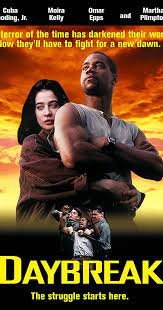
DAYBREAK
US, 1993, 91 minutes, Colour.
Moira Kelly, Cuba Gooding Jr, Martha Plimpton, Omar Epps, Amir Williams, David Eigenberg, Alice Drummond, John Cameron Mitchell, John Savage, Mark Boone Jr, John Seda.
Directed by Steven Tolkin.
Daybreak is one of the substantial collection of HBO movies for release in cinemas and for television made during the 1990s and into the 2000s.
This film is based on a one act play by Alan Bowne, Beirut, set in New York City and filmed in Washington Heights, 158 Street. The screenplay is considerably opened out.
The context is an epidemic, a disease sexually transmitted, frowned on by society. The play and the film were set in the context of the emergence of AIDS in the 1980s and continuing attitudes in the 1990s. The public is wary of the disease. Those infected are taken into quarantining which is virtually a prison experience, anyone attempting to escape being shot. In the meantime, there are various television clips with the president of the United States (John Savage) speaking patriotically and with the political face of care for the public.
The film shows the special squads which do the policing, the roundups, and exercise violence.
On the other hand, there are the ordinary workers, two young women played by Moira Kelly and Martha Plimpton, Blue and Laurie. Blue accompanies Laurie to get tested for the disease but they are warned off by a young boy and they decide against the test, tearing off the register page with their names, being pursued into the slums but rescued by a mysterious man, Torch, Cuba Gooding Jr.
Daybreak can be seen as a story about the resistance, rescue missions for patients, hiding them and helping them, especially in their dying. This is dangerous work, the special squad investigating and pursuing. Blue decides to return to the area where they were rescued, encounters Torch and becomes involved with the action, much of it dangerous. Torch is standoffish but gradually the relationship develops. The young boy is the son of a woman Torch was involved in but who has died.
The screenplay does not develop in quite the way anticipated. Laurie is concerned about Blue and asks questions which lead to the police squad taking over one of the rebels’ missions, pursuit, Torch being taken, discovered to be positive and interned in quarantine where he is tortured and imprisoned?
Blue decides to go into the quarantine to be with Torch, aided by her squad brother, smuggled in – reunion with Blue wanting to stay, Torch wanting her to leave. There are some graphic moments with a leering guard and lascivious behaviour, humiliating Blue. Torch persuades her to be smuggled out again and to be a leader with the rebels.
Included in the cast are Alice Drummond, memorable from Awakenings, here in her 60s (and continuing on films until she died aged 88), and John Cameron Mitchell, prolific and acting until he made headlines with his play Hedwig and the Angry Inch.
- The title? The climax and the decisions?
- The screenplay based on a one act play, called Beirut, set in New York City in play times? The opening out of the action?
- The context of the epidemic, the context of AIDS, the memories of the outbreak and spread of the 1980s, into the 1990s? Public reaction? Fears? Sexually transmitted illness? Caution, quarantine? But the fascist overtones of the quarantine, the ill-treatment of the patients, escapes and shootings, interrogations and torture?
- The initial settings, the woman attempting escape, pursued by the squad, the shooting? The squads, policing, controlling, violence? Ideology? Hunter and Bucky as part of the force?
- The television sequences, the President, his speeches, saving the people, action, seeming sympathy, yet behind the scenes?
- Blue, her work, will with Laurie? At home, the sick mother? Her relationship with Bucky? Laurie and her wondering about her health, going to the test, Willie and his notes warning against this? The mother and the outbreak in the centre, wanting to see her son, her being held back? Blue and Laurie and their apprehension, stealing the page? The pursuit, hiding, encountering Willie, encountering Torch, his drawing the pursuers off?
- Blue, dissatisfied, going to search for the centre, finding it cleared? Willie, taking her to the abandoned mansion, encounters with Torch, his initial hostility? The blossoming of the relationship?
- Blue, becoming involved with the resistance, the various members, Torch and his leadership? Hijacking the vehicles, saving the patients, hiding them, tending to them? The dangers, the pursuits, the episode with the ladder, Blue and her fears, Torch controlling her, saving? Blue continuing with the work, the mellowing with blue, the sexual relationship?
- At home, Bucky and his suspicions? The discussions with Laurie, confiding in Laurie? Laurie giving the information, leading to the police pursuit? Blue and her encounter with Laurie and giving up on her?
- Willie, the story of his mother, the relationship with Torch, sad aspects? Willie, the work for the rebels, his skill as a lookout?
- The plan for the evening, Blue going to help, the truck opening, full of the squad, Blue and Torch shutting the door, the escape? Torch and his being apprehended?
- Bucky, helping Blue, smuggling her into the quarantine centre, the false note to say that she was a patient?
- Torch, interrogated, tortured, tested, positive?
- Anna, her age, part of the resistance, yet her cover officially, helping Torch when he was tortured?
- Blue coming into the centre, the encounter with Torch, her wanting to stay, his wanting her to go? The guard, the lascivious behaviour, Blue humiliated? Torch explaining that she should live on and continue the work? The farewell?
- Blue, coming out, with Bucky, Anna, the rebels – and her leading them to future action?